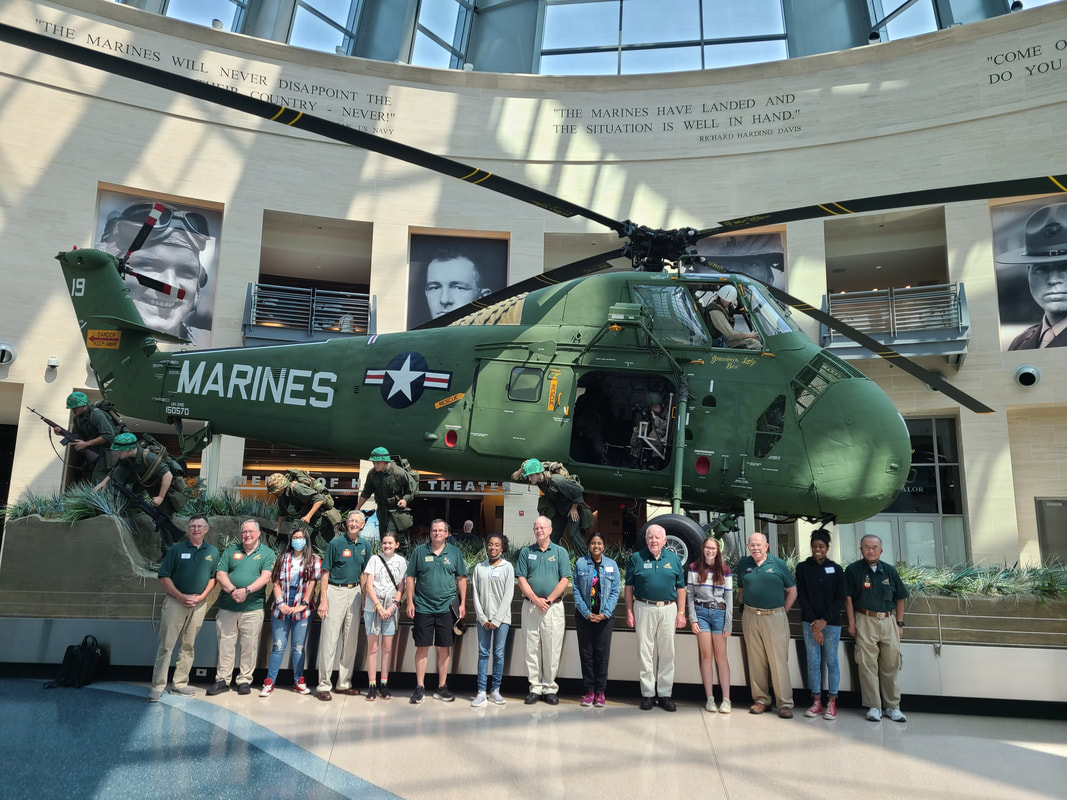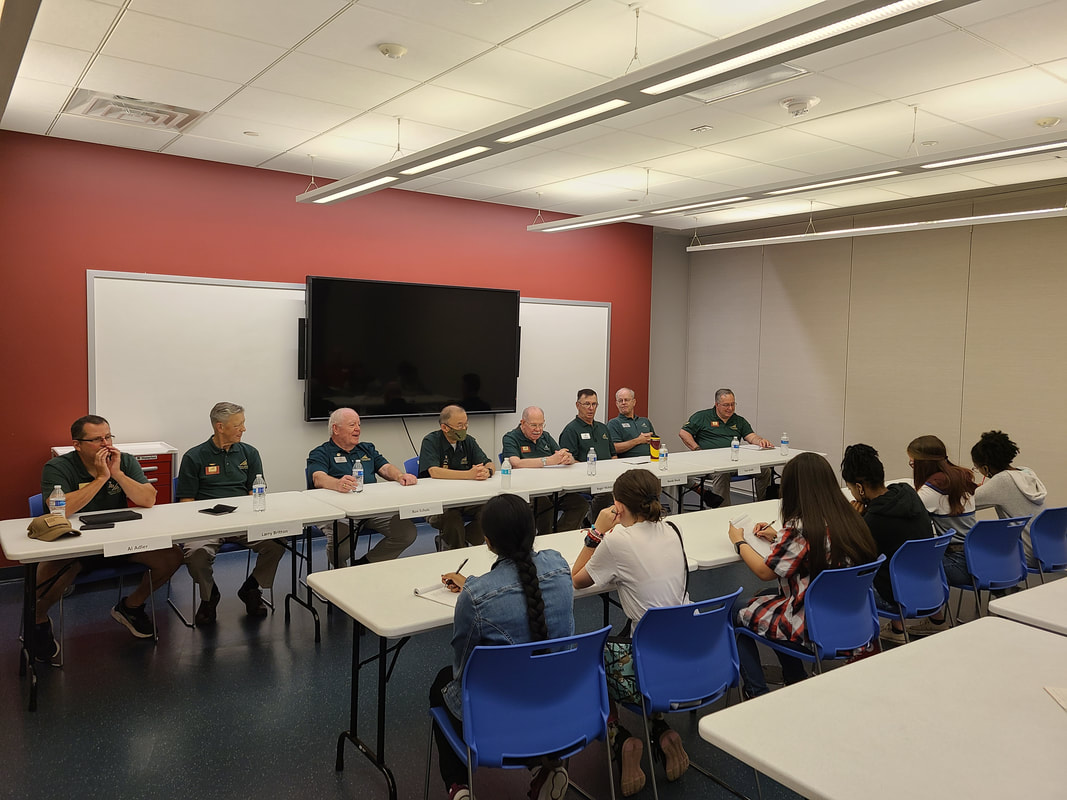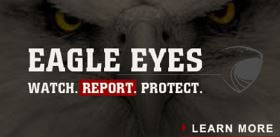Written By: Joi Harvey, Trinity Riollano, Katherine Archila-Mejia, Mollie Owen, Rushella Epperson and Varsha Palaniyandy
Edited By: Mollie Owen, and Varsha Palaniyandy
The National Museum of the Marine Corps recently held a Public Affairs summer program for high school students. Their culmination project was to interview eight military combat veterans, asking them about their experiences in theaters of war around the world, in both the Vietnam Wars and the War on Terror.
Meet the Veterans:
Al Adler served in the Marine Corps from 1981 to 2001, reaching the rank of gunnery sergeant. A few jobs he had were being a recruiter, various jobs in the intelligence field, and a rifleman. Al Adler fought in the Persian Gulf War.
Larry Britton served in the Marine Corps from 1966 to 1998. He was a helicopter pilot and was forward-deployed during Vietnam. Larry Britton fought in the Vietnam War.
Ron Echols served in the Marine Corps from 1964 to 1968. He served as an infantry platoon commander and lieutenant. Ron Echols fought in the Vietnam War and earned two Purple Hearts and the Bronze Star Medal.
John Hoy served in the Army from 1969 to 1997. A few jobs he had were as a defense contractor, an infantry ground troop, intelligence field, and was a part of the Special Forces. John Hoy fought in the Vietnam War.
Roger McIntosh served in the Marine Corps from 1955 to 1976. He served as an air traffic control warrant officer, and was enlisted. Roger McIntosh fought in the Vietnam War.
Randy Shuck served in the Marine Corp from 1968 to 1993. A few jobs he had were first sergeant, tanker, recruiter, drill instructor, and he served for twenty years in the CIA. He fought in the Vietnam and Panama.
Tom Smith served in the Marine Corps from 1966 to 1969. He served as a truck mechanic and as sergeant. Tom Smith fought in the Vietnam War.
Andy Traynor served in the Marine Corp from 1965 to 1992, reaching the rank of lieutenant colonel. A 'few jobs he had were tank officer, and infantry ground troop. Andy Traynor fought in Vietnam.
The Public Affairs Summer Program is excited to share the memories and stories of these military veterans with you. We hope you enjoy this article as much as we enjoyed writing it!
Many of our participants had interesting and intriguing experiences in their past training. Randy had even been a drill instructor. Although only a few of our veterans graduated from college, all of them graduated from high school. This is important to note because common things we learn in high school that we think we’ll never use were actually used daily in the military. High school algebra is something Roger used constantly while training for and working on an air strip.
Another thing to note is how tough boot camp and OCS (Officer Candidate School) was. At Tom's bootcamp, only eighty of one hundred twenty recruits graduated. Even though it was hard for these future veterans, it taught leadership, discipline, and how to work with people. Our veterans were taught things they can still use today.
Staying Connected
While they were deployed, these men put into practice many methods of keeping in touch with friends and family back home.
Before cell phones and email were available, they used good, old-fashioned “snail mail.” They would write “free” in the corner of the envelope, and wouldn’t have to pay for postage. Replies typically took three weeks to arrive, and sometimes our troops would write on whatever was available, like the lid of a ration box. Larry turned nineteen in Vietnam, and didn’t know it until three weeks after when he received the birthday cards. Marines would number their letters home, since their order sometimes got mixed up in the mail system and one would get ahead of the other.
There were other means of communication too. Roger and his wife mailed a little tape recorder back and forth to exchange messages. Some used the Mars radio, a system that involved an operator monitoring the conversation between a Marine and their family. If the family were to ask for confidential information, (how many Marines there were, where they were, etc.) the operator would tell the Marine not to answer. John used this system to talk to his mother, and when she started speaking Chinese, as that was the language she was most comfortable with, the operator asked John to ask her to speak in English. The military went to great lengths to keep their actions secure, and still allow the Marines a familial connection.
However, despite these efforts, it wasn't an entirely airtight bubble. One Marine’s grandmother wanted to know where her grandson was in the world, despite the fact that it was illegal. They came up with a clever idea. The Marine carried a postcard with the world map on it, while his grandmother had the exact same one. He would poke a hole in the envelope he was sending that lined up with wherever he was on the postcard. Then, when his family received his letter, they would match up the envelope with their copy of the postcard, and could tell where he was.
Some families would send their Marines care packages with goodies like candy. One kind of candy sent was Fizzies. You would put a Fizzy in your canteen, and it would make it taste like soda. However, some mischievous Marines would put them straight into their mouths, and would walk around with foam fizzing all over their faces.
Eventually, satellite phones became available in 2004, and iPads for video calls in 2018. As war and weapons modernize, so do our ways to stay connected to the people back home whom Marines fight to protect.
Interactions with Civilians
It is important to remember that any theater of war our military enters is a civilian's home. To us it may be a foreign jungle or desert; but to the people who live and work there, it’s their backyard. Vietnam was a dangerous place, and there wasn’t a lot of time to talk with locals. As Tom put it, “The times you were walking through a village were when you didn’t want to.” Despite this, Tom once met with a South Vietnamese village chief at a Buddhist funeral. The funeral was for the chief's son, an ARVN soldier killed in action. It was an eye opening experience coming from a western country.
In Andy’s experience, the Vietnamese village kids loved when the Marines came to visit. The kids were much better at picking up English than the Marines were at learning their native tongue, and soon the two groups learned to understand each other and communicate.
The US also conducted efforts that became known as the Golden Harvest. They protected Southern-grown crops like rice from the Viet Cong and the Northern Vietnamese, so the crop could sustain the villages it was grown in the way it was supposed to.
John also interacted with locals, but for a much different purpose. Due to his ability to easily pick up new languages, along with the fact that he was an ethnic Chinese, the government had a habit of sending him to places where “a Caucasian man would stick out like a sore thumb.” He talked with locals who he knew could either be friend or foe.
Efforts like this continue to this day. Al’s job was to gauge the success of humanitarian work in places like Somalia. He’d talk with locals to feel out how safe they felt, if they had the resources they needed, and if the humanitarian work had been at all successful.
Downtime in War
War has been described as “long periods of boredom followed by moments of extreme terror.” Military personnel did have downtime, even if it wasn’t particularly enjoyable to get free time in the middle of a dense jungle or bleak desert. The veterans agreed the quality of the break was determined by where they were. The most idyllic place was probably where they could have a shower and a bed to sleep on. In the instance they had access to a runway, or any strip of long, smooth land, Randy said the Marines would race “mule carts,” a type of open vehicle, down the runways. He said it was quite a sight to see: battle-hardened Marines excitedly racing their buddies with grins on their faces.
Ron remembers when, on Christmas 1967, the Marines in his unit got their hands on a football. They played a full game, until someone managed to kick the ball into a nearby minefield, which put quite an end to the game.
Christmas is a pretty well-known holiday, but the one closest to the Marines is the Marine Corps birthday, November 10th, 1775. Al says that every year, his unit would be given a cake, and they would sing the Marines’ Hymn as they celebrated the founding of the Corps.
Marines will always find a way to have fun, even if that “fun” sounds more like “danger” to us. They poked at venomous snakes in boxes and had contests about who could draw their weapons the fastest. Officers, knowing such a contest would escalate to something like, “bet you couldn’t do it if it was loaded,” were quick to put a stop to such pastimes. Still, it’s easy to hear these stories and remember that many of those sent to the Vietnamese front lines were teenagers and young adults, ones who were impulsive and thrill-seeking and young and dumb.
Even in war.
Coming Back Home and Making Ends Meet
Many of the veterans we talked to had a variety of jobs after getting out of the military. Most of them obtained government jobs, like Andy, who became a data processor. Larry, a Vietnam helicopter pilot, taught youth about flying, and Randy worked for the CIA. The veterans said when they got out of the military, many of them were offered a job at the San Diego Police Department. They declined, citing the riots riddling the city at the time, saying they had “just escaped the war across the sea.” Ron ended up pursuing a college degree at Virginia Tech.
The panel reached a consensus; more people wanted to hire them as a result of them being in the military, and it opened up opportunities which wouldn’t have been available otherwise. Andy said the preparation and everything he had been through in the military taught him about management and accountability. The veterans said they have had a positive impact as a result of serving, regardless of whether it was a job, support, or life-long friends.
Tom summed up our findings; these experiences matured him, and made him more capable to take on a leadership role at a young age.
Perceptions
Many of the veterans we spoke with had a strong desire to prove themselves. Most were told they wouldn’t make it in combat. Before joining, Al lived in New Jersey, a state that was going through a lot of racial injustice. When he joined the Marines, he was surprised to see how diverse the community was. No one cared about race or background, and everyone was treated as an equal. “There’s only one color in the Marines, ”Andy volunteered, “and that’s green.”
Growing up in a family with military background, Roger looked at joining the military as a tradition to uphold, and his own duty as an American. Joining changed his attitude, and he said it was “the best decision of my life.”
Tom expressed that joining the military was something he always wanted to do, and that it was one of the hardest things he could accomplish. He gained rewarding friendships.
Randy joined to prove himself. Like John, before joining he thought it would be the hardest thing to get through. After joining, Randy noticed that he’d developed a fear of letting his buddies down.
Larry was inspired by his father, who served in World War II starting when he was three months old, and returning when Larry was three and a half. His wife’s family didn’t think that this future veteran would make it, but time would prove them wrong.
Andy had always wanted to be a Marine. After joining, Andy valued the brotherhood he had with his fellow Marines, and he always tried his very best to protect his friends. There was one instance in Vietnam where he was part of a helicopter crew that was attempting to conduct a medical evac for a wounded Marine. The ground report was clear; they were taking heavy fire with rifles and RPGs and the Viet Cong were not backing down.
They were advised not to land because “they probably wouldn’t make it back into the air.” The crew landed anyway.
The wounded Marine was brought aboard and the pilot lifted back off in a hail of gunfire. There were holes in her side (helicopter), but she’d make it to the camp.
At one point, Andy looked at the Marine. The wounded Marine, covered in four or five massive bandages criss-crossing his torso, saw him looking.
Covered in bullet holes, he raised his head, flashed a grin and gave Andy a big thumbs-up. “That,” Andy said, while speaking to us decades later, “is what it’s all about.”
Thank you to the veterans who spoke to us!
Authors
Written By: Joi Harvey, Trinity Riollano, Katherine Archila-Mejia, Mollie Owen, Rushella Epperson, and Varsha Palaniyandy
Edited By: Mollie Owen, and Varsha Palaniyandy
This blog post is final project for our Public Affairs Summer Program hosted by the NMMC Education team in July 2021.



 RSS Feed
RSS Feed







